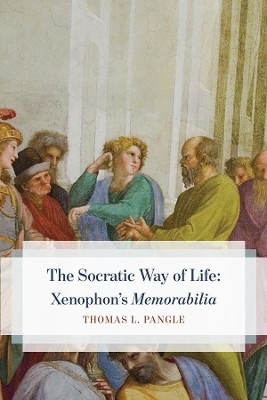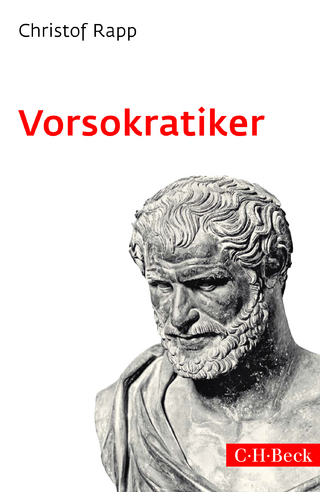
The Socratic Way of Life
University of Chicago Press (Verlag)
978-0-226-75426-0 (ISBN)
In the first part of the book, Pangle analyzes Xenophon’s defense of Socrates against the two charges of injustice upon which he was convicted by democratic Athens: impiety and corruption of the youth. In the second part, Pangle analyzes Xenophon’s account of how Socrates’s life as a whole was just, in the sense of helping through his teaching a wide range of people. Socrates taught by never ceasing to raise, and to progress in answering, the fundamental and enduring civic questions: what is pious and impious, noble and ignoble, just and unjust, genuine statesmanship and genuine citizenship. Inspired by Hegel’s and Nietzsche’s assessments of Xenophon as the true voice of Socrates, The Socratic Way of Life establishes the Memorabilia as the groundwork of all subsequent political philosophy.
Thomas L. Pangle is the Joe R. Long Chair in Democratic Studies in the Department of Government at the University of Texas at Austin. He is the author or editor of numerous books.
Introduction
Part One: Socrates’s Innocence of the Injustices for Which He Was Executed
1. Socrates Was Not Guilty of Impiety or Disbelief as Regards the Gods of Athens
His Piety Proven by His Worship
His Belief Proven by His Daimonion
His Belief Proven by His Teaching on Divination
His Belief Proven by His Attitude toward Natural Science
His Belief Proven by His Fidelity to His Sacred Oath
Concluding the Defense against the Charge of Impiety or Disbelief
2. Socrates Was Not Guilty of Corrupting the Young
Answering a Nameless Accuser’s Charge That Socrates Promoted Contempt for the Athenian Regime and Laws
Starting to Explain His Association with Critias and Alcibiades
In What Sense Virtue Is Knowledge
The Big Differences between Critias and AlcibiadesCritias
AlcibiadesExplaining the Teaching of Socrates That Wisdom Is the Title to Rule
Transition to Part 2 of the Memorabilia
Part Two: Socrates’s Active Justice, as Benefiter of Others
3. How Socrates Benefited through His Piety and His Self-Mastery
His Teaching on Praying and Sacrificing
Socrates’s Self-Mastery vs. Xenophon’s Sexual Indulgence
Socrates’s Teaching on Divine Providence
Socratic Self-Mastery vs. Conventional Self-Mastery
The Virtue That Socratic Self-Mastery Serves
Socrates’s Discouragement of Boasting
His Teaching of Self-Mastery for the Sake of a Life Dedicated to PoliticsThe Setting of the Dialogue
Self-Discipline as Crucial to Education for Ruling
Why One Must Seek to Be One of Those Who Rule
Why the Active Political Life Is the Good Life
Heracles’s Choice
4. How Socrates Benefited in Regard to Family and Friends
Attending to His Son and Wife
Attempting to Reconcile Feuding Brothers
Socrates on the Value of Extrafamilial Friendship
Promoting Reflection on One’s Own Worth as a Friend
Socrates on the Power and Problem of Friendship among Gentlemen
How Socrates Helped Friends in Serious Economic DifficultiesA Socratic Revolution in a Desperate Friend’s Household
Socrates’s Advice to a Fellow Economic Misfit
A Glimpse of Socrates’s Own Economic Art
Extending His Economic Art
5. How Socrates Benefited Those Reaching for the Noble/Beautiful (Kalon)
His Playful Teaching of Noble Generalship
Interpreting Homer on the Virtue of a Good Leader
On the Goal Aimed at by a Noble Commander
Assimilating Military-Political Rule to Household Management (“Oeconomics”)
His Earnest Teaching of Noble Generalship
On What a Statesman Needs to Know
Socrates Exhorting to a Career as a Democratic Leader
How Is the Beautiful/Noble Related to the Good?
The Virtues as Noble/Beautiful
Socrates as Arbiter of the Beautiful/Noble in Art
The Profitable Beauty of Socrates’s Soul, Reflected in Comic Allegory
Exhorting to the Cultivation of Beauty of Physique
Promoting Everyday Self-Mastery and “Living Decorously”
6. Socrates as Beneficial Tutor
The Seduction of Euthydemus
The Centrality of Justice, as a Virtue of Speech and Deed
The Refutation of Euthydemus’s Convictions Regarding Justice
The Refutation of Euthydemus’s Convictions Regarding the Good
The Refutation of Euthydemus’s Conception of Democracy
Making Euthydemus Moderate as Regards Divinity
Socrates Teaching Justice
Teaching His Companions Self-Mastery
Making His Companions More Dialectical
Teaching His Associates Self-Sufficiency in Deeds
Xenophon’s Conclusion
Notes
Works Cited
Index
| Erscheinungsdatum | 23.09.2020 |
|---|---|
| Sprache | englisch |
| Maße | 152 x 229 mm |
| Gewicht | 399 g |
| Themenwelt | Geisteswissenschaften ► Geschichte |
| Geisteswissenschaften ► Philosophie ► Philosophie Altertum / Antike | |
| Sozialwissenschaften ► Politik / Verwaltung ► Politische Theorie | |
| ISBN-10 | 0-226-75426-X / 022675426X |
| ISBN-13 | 978-0-226-75426-0 / 9780226754260 |
| Zustand | Neuware |
| Informationen gemäß Produktsicherheitsverordnung (GPSR) | |
| Haben Sie eine Frage zum Produkt? |
aus dem Bereich


